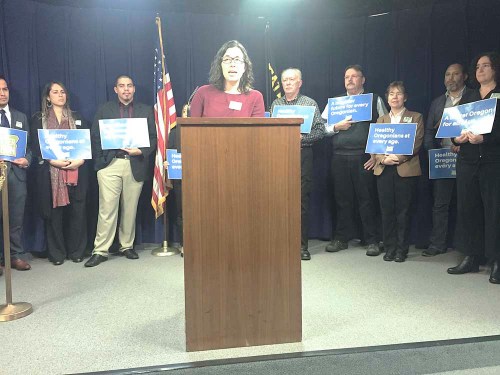No headline.
Published 10:26 am Tuesday, December 13, 2016

- Paris Achen/Portland TribuneAndrea Paluso, executive director of Family Forward Oregon, announces A Better Oregon's legislative proposals for the 2017 session during a press conference Dec. 13, 2016, at the Oregon Capitol in Salem.
SALEM — The two sides that clashed bitterly over a corporate sales tax measure on the Nov. 8 ballot profess to a willingness to work together to find a solution to Oregon’s chronic revenue instability.
But so far, both appear to be marking their battle lines, only this time for a skirmish in the Legislature rather than at the ballot box. Lawmakers face a delicate tightrope act in which they hope to prevent alienating one side or the other.
Many of the players from both sides will remain the same as the fight moves to Salem. And in many ways, their messages going forward echo those they highlighted during the election.
Business leaders have conceded the state needs more revenue. But they are demanding state pension reform and curtailed spending before they agree to any new business taxes.
Meanwhile, A Better Oregon, which ran the Measure 97 campaign, continues to hammer on the need for big corporations to be more transparent and to pay their fair share.
Sen. Mark Hass, D-Beaverton, chairman of the Senate Committee on Revenue, recently illustrated the challenge with a quip: If he could get people to agree to tax guitar playing, he would go for it.
A Better Oregon, a coalition of public unions and advocacy groups, unveiled its legislative proposals including a scaled-back corporate sales tax, an expansion of health care provider taxes and a requirement that companies disclose what they pay in taxes.
Meanwhile, the business community is solidifying the power it realized during the election, when its unified resources and messaging defeated the $3 billion annual tax measure.
During the annual Oregon Leadership Summit Dec. 5, business leaders said they were open to new business taxes, but only if lawmakers also reformed the costly state retirement plan and made an effort to clean up wasteful spending. Pension reform will likely be a sticking point for the union-backed A Better Oregon, which has said it opposes any reductions to retirement benefits.
Those same business leaders, however, have not answered calls from Gov. Kate Brown and others to present specific revenue-raising proposals they would accept. Brown used her speech at the leadership summit to specifically ask business leaders for such proposals. Business representatives say it’s up to the governor to make the first move.
“Right now, we would hope and expect that the governor and elected leaders will lead this process,” said Sam Tannahill, chairman of the Oregon Business Association. “The governor certainly put a challenge in front of the business community. However, at the same time, she said in the same speech: ‘Make no mistake; we will lead.’ That is something we are expecting her to do. The only thing we are saying is everything should be on the table.”
The Oregon Business Association and Associated Oregon Industries, which will merge in July, will be main players in any negotiations over new business taxes. They’ll coordinate efforts through regular meetings of a new 10-member executive committee, Tannahill said. The lineup has yet to be finalized, but representatives from Portland General Electric, Bank of America Merrill Lynch, PacificCorp Transmission and A-dec dental equipment and supplies will have seats on the committee.
A Better Oregon, which offered the $6 billion corporate sales tax measure that was defeated on Nov. 8, has proposed a smaller tax of 2 percent on corporations’ Oregon sales exceeding $100 million.
The tax would raise about $4 billion a biennium to address the state’s projected $1.7 billion revenue shortfall for 2017-19 and increase spending for education and health care. A Better Oregon also endorses a proposal by the governor to expand the health care provider tax.
The new corporate tax proposal is 0.5 percentage points less than the 2.5 percent rate proposed in Measure 97 and applies to all corporations with sales exceeding $100 million instead of only C corporations’ sales exceeding $25 million. Utility companies would be exempt from the tax.
The changes were a response to criticism of Measure 97, said Andrea Paluso, executive director of Family Forward Oregon, a member of A Better Oregon.
“It would protect homegrown businesses and call on the largest corporations doing business in our state to pay their fair share,” Paluso said.
Lawmakers are still brainstorming ideas for raising revenue that would satisfy both sides. Sen. Hass may try to revive his proposal, made during this year’s February session, for a commercial activity tax. The tax would replace the corporate income tax. A .39 percent tax on businesses with sales greater than $5 million would raise $1.3 billion in 2017-19 and $2 billion in 2019-21, according to the nonpartisan Legislative Revenue Office. However, eliminating the corporate income tax would trim the net revenue gain to $500 million to $1 billion, Hass said.





